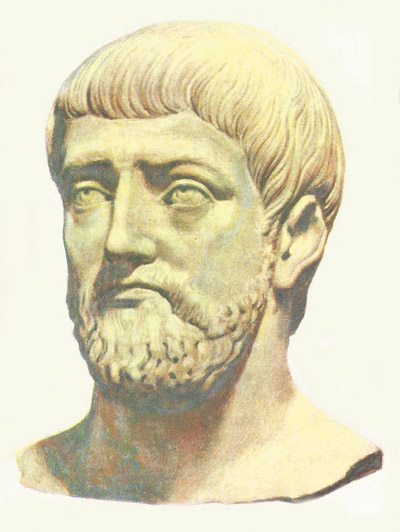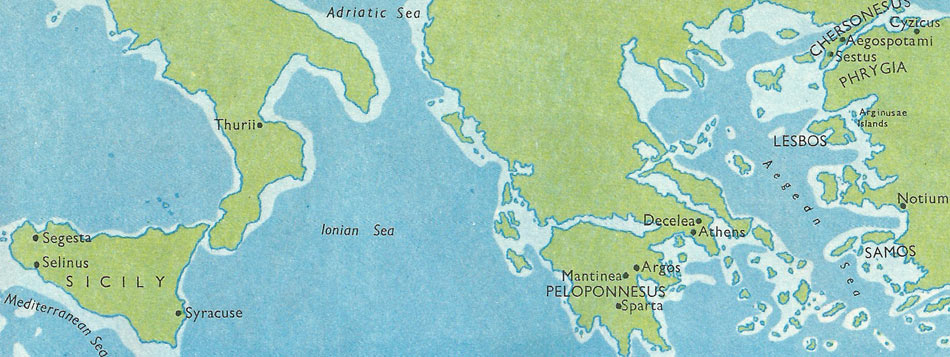Alcibiades

Alcibiades, Athens' friend and foe.

Map of the places visited by Alcibiades.
In the year 420 BC the Athenians elected the young Alcibiades to be one of the 10 generals who commanded their armed forces. This choice was, in the end, to prove disastrous. But who can blame them for succumbing to the personality of this handsome, brave, and intelligent young man? Though he was impetuous and insolent, all Athens admired his eloquence, his sharpness, and his wit.
Alcibiades was born in Athens in about 450 BC. His mother was a cousin of Pericles in whose house Alcibiades was brought up after the death of his own father. Pericles became very fond of him; and together with Socrates, the famous philosopher, he tried in vain to discipline and direct the young man's many talents.
When Alcibiades was elected general in 420 BC peace had just been made between Athens and Sparta. But Sparta's allies were dissatisfied with the peace terms, and Alcibiades did all he could to stir up trouble. He persuaded the Athenians to make an alliance with Argos, Sparta's traditional enemy, hoping that he would be given command of a large Athenian army in the Peloponnesus. But Nicias, his rival at Athens, accused him of provoking unnecessary disputes. Alcibiades was not re-elected general in 418; and Sparta decisively defeated the Argives and their allies at Mantinea.
The Sicilian expedition
Alcibiades now looked for other means of satisfying his ambition. An opportunity came when Segesta, a Greek city in Sicily, appealed to Athens for aid against Selinus, ally of the powerful city of Syracuse. Alcibiades encouraged the Athenians to equip an enormous expedition. He painted glowing pictures of Sicily, and of the possibility of Athenian conquests there. The more cautious Nicias was opposed to the expedition, and warned the Athenians of its difficulty and expense. But Alcibiades had fired their imagination: they insisted that both Nicias and Alcibiades, with another general called Lamacus, should go as joint commanders.
When the great fleet was about to set sail, in 415 BC, a strange event happened. The Athenians were shocked one morning to find that during the night someone had mutilated the Hermae – the square stone pillars, surmounted by busts of the god Hermes, set up at street corners and in front of houses. No one ever really discovered who had done this; but Alcibiades was suspected. (He was almost certainly not guilty, although he was notoriously wild and irreligious.)
Alcibiades wanted to be tried and acquitted before he set sail; but his enemies managed to prevent this. Not until he was already directing operations against Syracuse was he recalled to stand trial.
Alcibiades changes sides
Alcibiades now realized that his enemies in Athens were plotting to have him put to death, for most of his supporters were with the expedition in Sicily. On the way back to Athens he escaped at Turii and crossed Sparta. Here he found Syracusan envoys appealing for Spartan help against the Athenians. Alcibiades urged the Spartans to send a Spartan general to Syracuse, and to seize Decelea in Attica – the key to Athens's communications by land. This the Spartans did; and the Sicilian expedition ended as a colossal failure for the Athenians.
Meanwhile Alcibiades sailed with the Spartans to persuade Athens's allies in Asia Minor and the Aegean to revolt. But the Spartans did not trust him, so he fled to the Persians.
Alcibiades could not return to Athens while the democrats remained in power. He therefore encouraged those who were disillusioned by the democracy's failure in the Sicilian campaign, and wanted to establish an oligarchy in Athens. They managed this in 400, partly because most of the poorer citizens were away serving in the fleet, which by now was at Samos. But the democrats set up a democratic government of their own at Samos and recalled Alcibiades. They proposed to sail at once to Athens and restore democracy there; but Alcibiades dissuaded them; it would mean, he pointed out, abandoning what was left of the Athenian empire to the Spartans, and civil war at Athens. Instead, leading the democrats' fleet, he defeated the Spartans at Cyzicus; the oligarchy at Athens collapsed; and Alcibiades was welcomed as a 'liberator' from the very oligarchy for which he had paved the way – though he did not actually return to the city until 407.
The Athenians hoped Alcibiades would be able to use his influence with the Persians to make an alliance; but he was unsuccessful; and to this failure was added a defeat by the Spartans at Notium. The Athenians did not re-elect him general. Rather than return to Athens in disgrace he retired to the Chersonese.
The Athenians won one more victory, at Arginusae in 405 BC; but next year their fleet faced the Spartans at Aegospotami, Alcibiades returned to the scene and advised the Athenian commanders to move to Sestus. They would not, and next day were defeated by Lysander in the final, decisive battle of the Peloponnesian War. Alcibiades fled to Phrygia, where he was murdered by the Persians.
Alcibiades was one of those men whom it is dangerous to have on one's own side, but even more dangerous to have as an enemy. Athens, to her great misfortune, experienced him as both.
